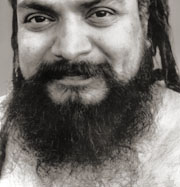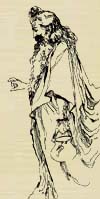Humor in Yoga Vasishta
Yoga Vasishta is a challenging read because of its length, its setting in medieval India, and the subject matter itself, the nature of reality. It does not make the reading any lighter when Vasishta regularly describes people who believe in external reality as worse than beasts. He is dead serious about despising everything the world has to offer. Yet there is also humor in Yoga Vasishta.
Book III has the story of men in a desert, alternating among beating themselves, falling into pits, and jumping into thorny thickets. (III.98)
Vasishta recognizes humor in another story. “Now, Rama, listen as I tell you the story of the false and fanciful man. It is pleasant to hear and quite ludicrous and laughable from first to last.” (VIA.112.15) It is the parable of the blockhead who imagines a home for himself from where he can rule his empire that is a void. Of course, it is a story about us.
Some humor is in the word play. Mitra in his translation notes the use of alliteration in the original Sanskrit descriptions of battle. “The whole of this chapter abounds in onomatopoeian alliterations, and is more a play upon words than a display of meaning. However, it is interesting for these jingling words and for the names of the weapons in use among the ancients.” (Mitra’s footnote to III.33) Chapter 165 in Book VI, part 2, is obviously a word play on daydreams and sleep-dreams.
The story of Gadhi includes citizens using the royal elephant to choose their next king. Vasishta seems to enjoy the situation. “The royal elephant was employed as a jeweler to select the best gem to be placed on the royal throne.” (V.44.29)
Some of the humor is more subtle. Consider the premise of the demon Karkati (“Crooked Crab”) who undertakes tapas in order to become a needle, Suchi (“Pin”). The needle is cholera. The demon relents and does tapas again and is restored.
It is hard to read the story of Queen Chudala and King Sikhidwaja without smiling. Chudala attains enlightenment but Sikhidwaja, somewhat sexist, cannot bring himself to believe that his wife can teach him anything about spirituality. Ignoring the treasure he has in his wife, he abandons his kingdom to live as a hermit. She uses her yogic powers to appear to the royal hermit in the form of a brahmin boy. He had not listened to his wife, but now he believes what the boy has to say, which is that even a hermit can be attached to things. So the hermit-king ceremonially burns his remaining meager possessions, even his hut. The description of his ceremony is almost comic because the king still doesn’t get it. (VIA.92) By the end of story, he does.
Significantly enough, Yoga Vasishta has only happy endings.
![]()

